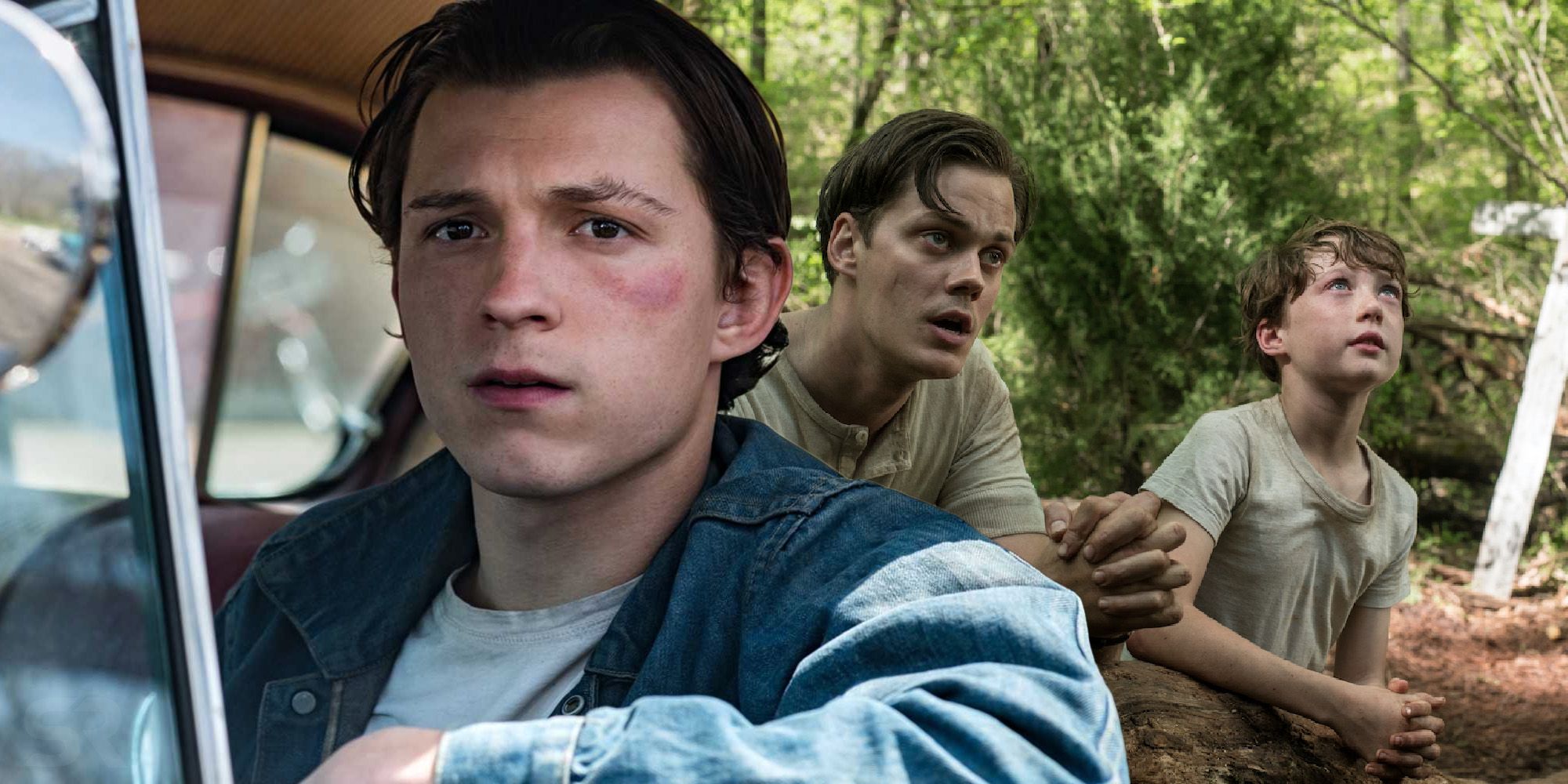
WARNING: Spoilers for The Devil All The Time
Netflix’s recent release, The Devil All The Time, takes place over the span of 20 years, often skipping back and forth in time; here’s an explainer on what happens when, and how the timelines intersect. The film follows the story of Arvin Russell (Tom Holland), tracing both his life and the lives of those around him, as both coincidence and intent cause the paths of three key families to cross and converge. Deeply affected by the erratic behavior of a father traumatized by war and loss, Arvin must navigate an unkind world of his own, where he fiercely protects those he loves.
There are three families, essentially, to keep track of: The Russells, The Lafertys, and the Bodeckers. Even the smallest of actions taken by these central characters in The Devil All The Time can gradually snowball into the catastrophic events that happen throughout the film as each family’s timeline slowly spirals in towards Arvin. As the years pass, he becomes trapped in an inescapable cycle that leaves many casualties along the way. Though not everything in the film is done in the name of long term revenge, the characters often pay for the sins of their predecessors all while recreating those same sins in their own lives.
Though told somewhat chronologically, the film does often skip forward and double back throughout the lives of its characters, weaving a fascinating and intricate web. The echoes of chance encounters reverberate throughout the film and characters perpetuate cycles of behavior, often unwittingly but sometimes with a resigned clarity. The Devil All the Time and its many timelines can be understood by tracing each family’s journey through five key time periods: the late 1940s, the year 1950, the year 1957, the spring of 1965, and the summer of 1965. Let’s take a look at the events of the many timelines of The Devil All the Time and how they all connect.
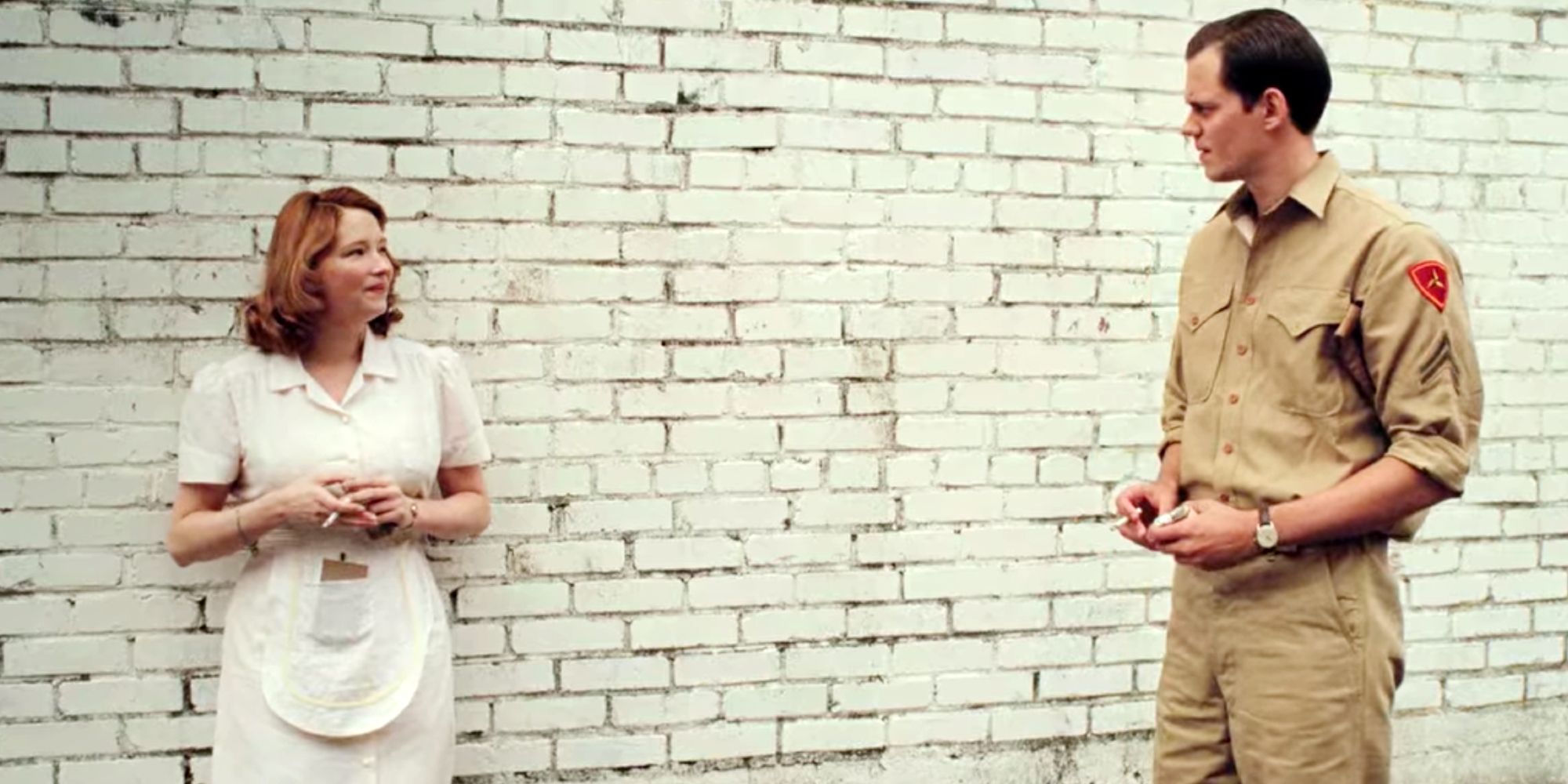
The earliest events of the film take place mainly in the mid to late 1940s; they have significant and lasting effects over the course of the following 20 years. After returning from military service overseas, Willard Russell (Bill Skarsgård) is haunted by memories of the crucified Marine he euthanized, and despite starting a family and a new chapter in his life, the trauma follows him until his death, even leaving its legacy behind in his son. It is also in the late '40s that Willard gives Uncle Earskell a German Luger from the war, which later becomes the tool of Arvin's violence. Most importantly, when Willard enters the diner in Ohio on his way home, he inadvertently sets into motion two chance meetings that drive the movie's story. This first is, of course, Willard meeting Charlotte (Haley Bennett), who will go on to become his wife and Arvin’s mother. The second is the meeting of Carl (Jason Clarke) and Sandy (Riley Keough), who also become pivotal figures.
Though it is only a casual gesture, Carl giving Willard his seat at the diner counter is one of the film’s most important moments: if it hadn’t happened, Sandy and Carl might not have met, and Arvin might never have been born, nor would Lenora. And because nothing is without consequence, Willard’s love for Charlotte contributes to the formation of a third key relationship–– that of Helen Hatton (Mia Wasikowska) and Roy Laferty (Henry Melling). When Willard shows no interest in Helen, she is free to pursue Roy, resulting not only in Lenora’s birth, but also in establishing the cycle that Lenora will eventually follow herself as she walks a path parallel to her mother’s. These crucial events set the stage for The Devil All the Time, and drive home the grim sense that everyone is trapped in endless cycles of violence and depravity despite even the best intentions.

In 1950, much of Lenora’s backstory is established when she is orphaned in her infancy. When Roy becomes convinced that a spider bite he received during a sermon is a test from God and locks himself in a closet for weeks on end, he emerges unhinged. Convinced he is part of a larger plan, he takes Helen to a clearing and kills her, believing that God has given him the power to revive her. When he fails, he buries Helen’s body and flees town, only to decide to hitchhike his way back to West Virginia to see Lenora (Eliza Scanlen). When Carl and Sandy pick him up and kill him as one of their early victims, Lenora is orphaned and left in Emma Russell’s care, while an unsatisfactory encounter with Roy encourages Carl and Sandy to solidify how best to select and kill their victims.
Meanwhile, Willard and Charlotte have settled down in Knockemstiff, Ohio, where they plan to raise young Arvin. Willard finds himself suddenly moved to reconcile with God, fearing for his family’s well being. Both Willard’s newfound faith and Emma Russell’s stewardship of Lenora contribute to the events triggering Arvin’s turn to violence; Roy’s death is the first of many carried out by Carl and Sandy. As the years go by, the timelines begin to circle Arvin.
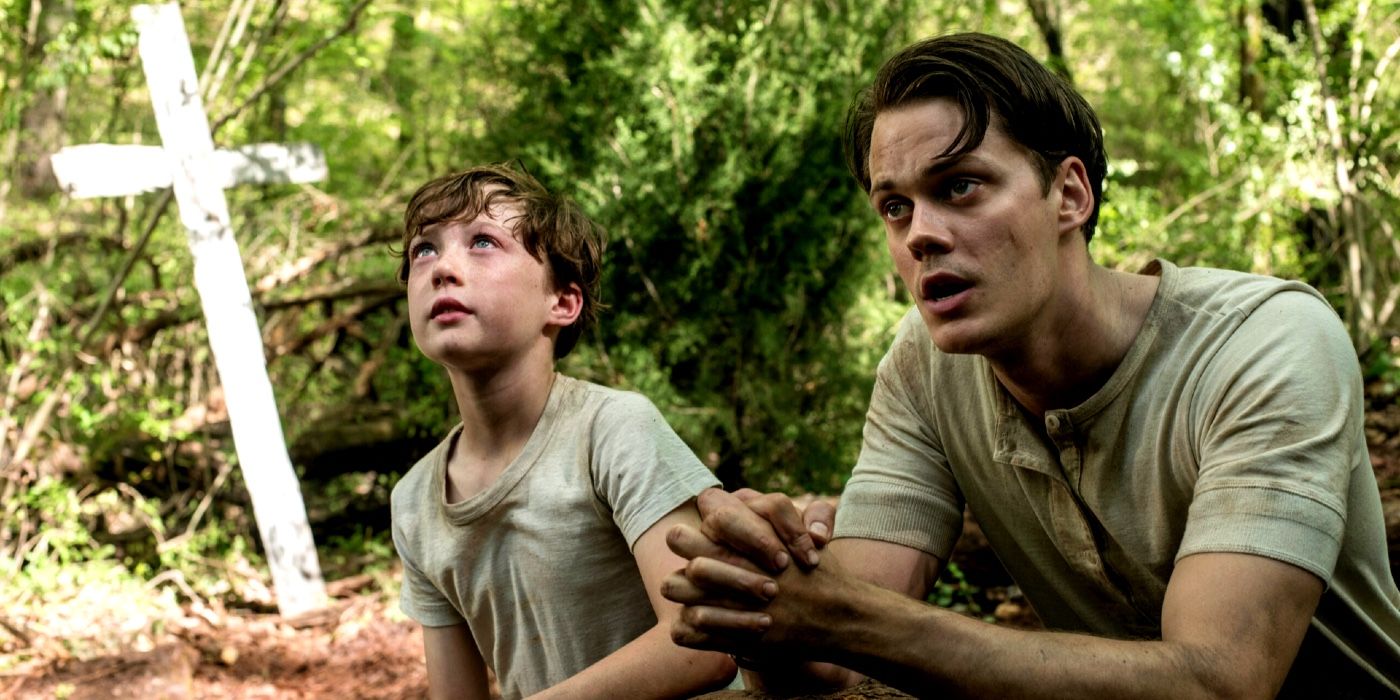
The first pivotal moment from 1957 is Willard’s brutal beating of two men who make crass comments about Charlotte while Willard and Arvin are praying. This example sets the standard for Arvin when Willard tells him to follow suit the next time bullies threaten him. Arvin’s own experiences with bullying are echoed by what Lenora later goes through, and this moment with Willard is key in informing Arvin’s violent reaction. Unfortunately, when they return home, Arvin and Willard find Charlotte collapsed in the kitchen, and a visit from the doctor reveals that she has late-stage terminal cancer. Despite fervent prayers, Charlotte’s condition continues to worsen, and Willard goes to drown his sorrows at a bar. There, two key things happen: first, Sandy serves Willard his drink and directs him to some back rooms where he might find some "company." This marks the first time that Sandy is linked to prostitution, which will later threaten the political career of her older brother, Lee Bodecker.
The second important event at the bar is Willard’s drunken decision to kill Jack, the family dog, inspired by the mounted stag head above the entrance to the back rooms of the bar. In an effort to prove his faith to God and save Charlotte, Willard kills and crucifies Jack, traumatizing Arvin. Tragically, Charlotte dies not long after, and Willard kills himself the night after her funeral. Deputy Lee Bodecker (Sebastian Stan) is introduced, expressing his political ambitions to his girlfriend, driven chiefly by a desire to become wealthy; a trait that will become key to his story. Bodecker comes to collect Arvin, and in an intense moment that is only revealed near the close of The Devil All the Time, reveals to the boy that his own father walked out on his family, and that he believes that “some people were born just so that they could be buried.” Though he is encouraging Arvin to move on from his traumatic past, Bodecker actually foreshadows his own life of corruption and eventual death.
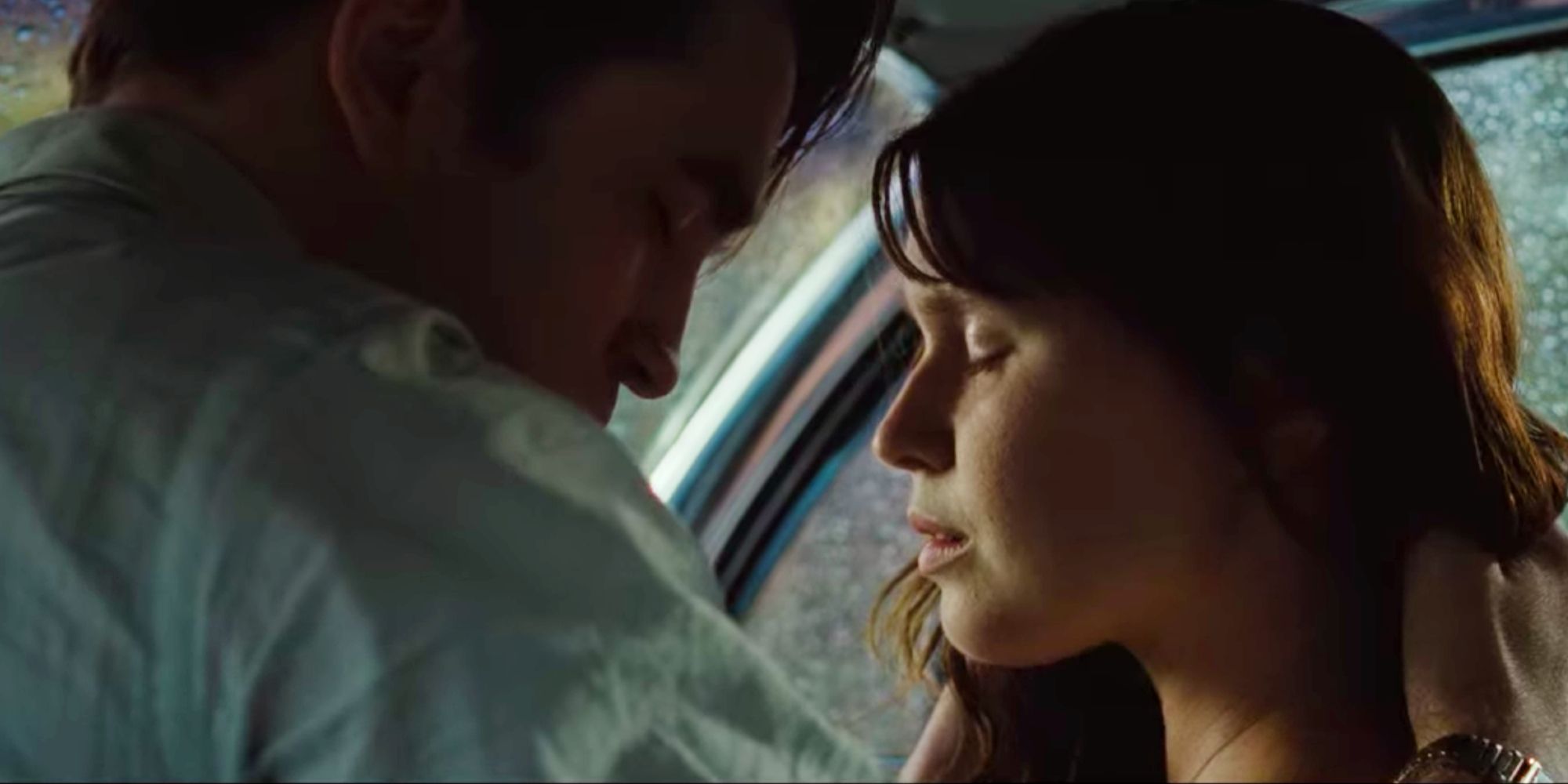
Eight years later, while celebrating Arvin’s 17th birthday, Uncle Earskell gifts him with a German Luger that Willard brought back from the war. The gift, while well-intentioned and genuinely meaningful, locks in Arvin’s fate, giving him the tools to follow in his father’s violent footsteps. Arvin’s descent into violence is triggered at school, where Lenora is subject to bullying and sexual harassment from her classmates. Arvin fights them off to protect her, but later seeks them out to unexpectedly and brutally beat each of them in turn, just as his father did to the men who spoke ill of Charlotte in 1957.
While Arvin is off on this crusade, Lenora is left to visit the grave of her mother, Helen, alone. The newly arrived Reverend Teagardin (Robert Pattinson) invites her to drive somewhere private with him so that they may pray together. Reflecting the way that Roy enticed Helen with the intensity of his faith, Teagardin convinces Lenora to sleep with him by manipulating her and claiming that she is bearing herself to God as an act of faith and courage. The two continue their sexual relationship in secret.
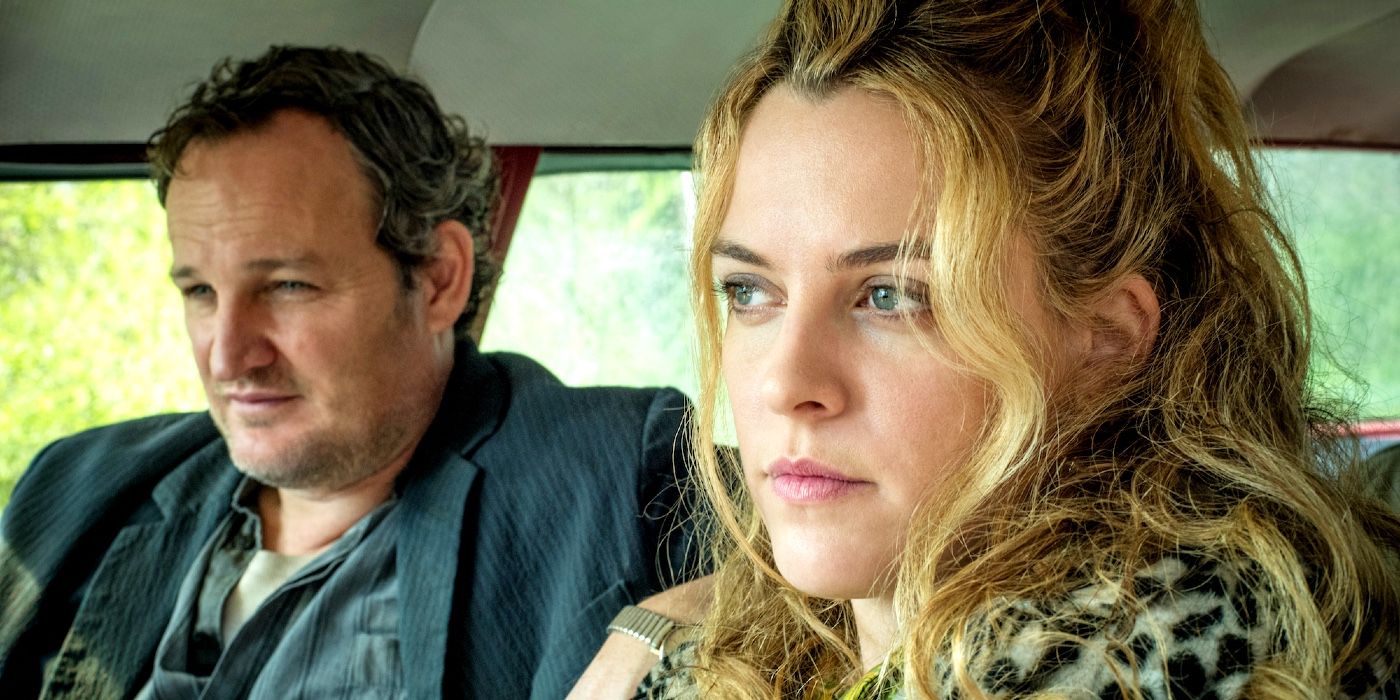
Three months later, during the summer of 1965, Sandy contemplates deserting Carl. Though she decides against it, Carl catches her up late and becomes suspicious of her intentions, sowing the seeds for her imminent death. The next morning, Lee Bodecker, the cop who investigated Willard’s suicide in 1957, visits Sandy and reveals their familial relationship to the audience. Viewers are reminded once again that he values political success above all else when he is revealed to be a dirty cop. Desperate to cover his tracks, he later kills crime boss Leroy and Leroy’s assistant Bobo, proving that the moral superiority he expressed to Arvin in 1957 is built on false foundations.
Meanwhile, a pregnant Lenora has decided to take her own life after being gaslit by Reverend Teagardin, who insists that she is delusional. Though she decides at the last minute not to go through with it, Lenora accidentally completes the act, completing the cycle of the Laferty family in The Devil All the Time by dying, like her mother, due to the actions of her lover, a corrupt religious man. Lenora’s loss motivates Arvin to uncover the truth about the Reverend; that he is the father of Lenora’s child, and a serial abuser of his power. Arvin kills him and exposes his wickedness before going on the run.
Arvin gets picked up by Carl and Sandy while hitchhiking back to Knockemstiff after his car breaks down. He kills them both to save his own life, but only avoids being killed by Sandy because Carl, in his paranoia, switched the bullets in Sandy’s gun for blanks just a few days before. Sandy and Carl’s cycle is complete; they die together at the hands of the son of the man who inadvertently united them. When Lee Bodecker is called to the scene, he discovers the truth about Carl and Sandy and once again covers it up to protect his political interests. When he figures out Arvin’s role in his sister’s death, Bodecker goes to Knockemstiff to kill him. Arvin is able to bury the bones of his childhood dog Jack before Lee arrives, achieving closure for one of his greatest childhood traumas. When Lee arrives, the two have a standoff that is eerily full circle.
Bodecker dies a corrupt man, becoming the very thing he warned nine-year-old Arvin against. Arvin, now grown, has lived a life of violence parallel to that of his father, despite the good intention of protecting his family. He buries the Luger with Jack's bones, tying off the end of this chapter in his life. While hitchhiking to a new town, Arvin considers his future in a moment that should be hopeful, but actually reinforces The Devil All the Time’s brutal theory: Tom Holland's Arvin remains bound to repeat his father’s actions once again. Arvin identifies three options for himself: going off to fight in Vietnam, discovering faith in God, and starting a family of his own. It seems inevitable that he will do all three of these things, just like his father did, which will only restart the cycle, threatening to trigger another harrowing series of events equally as horrible as what he survived in his youth.
from ScreenRant - Feed https://ift.tt/35MDbJK






0 Comments
Please don't use vulgar comments and avoid discussion on Religious matters